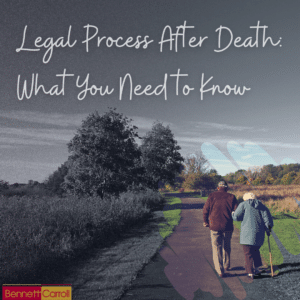Creating a Will in Queensland is one of the most important steps you can take to ensure your assets are distributed exactly as you intend. But writing a Will is only part of the process — you also need to protect it from disputes, errors, and unintended outcomes.
Here’s how to safeguard your estate and ensure your wishes are respected, from the experienced Queensland estate planning lawyers at Bennett Carroll Solicitors.
1. Create a Legally Binding Will
A Will must meet strict legal requirements to be valid in Queensland. That means:
-
It must be written and signed by you (the testator).
-
It must be witnessed by two people who aren’t beneficiaries.
-
You must have testamentary capacity (sound mind and understanding).
💡 Unsure if your Will is legally valid? Book a Will review with our Queensland Wills lawyers →
2. Get Professional Legal Advice
DIY Wills often cause costly disputes. Our estate planning solicitors ensure your Will is legally sound, clear, and tailored to your unique circumstances.
👉 Protect your family’s future — contact our Wills & Estate Planning team today for practical legal advice.
3. Be Clear and Specific
Ambiguity causes conflict. Clearly outline:
-
Who receives your assets and personal items
-
Who acts as your executor
-
Who you nominate as guardian for children
✅ Learn more: Choosing the Right Executor in Queensland →
4. Update Your Will Regularly
Marriage, divorce, children, property changes — all require a Will update.
Review your Will every 2–3 years or after major life events.
📞 Need to update your Will? Call our team on 1300 334 566.
5. Store Your Will Securely
Keep your Will in a safe, accessible place. Bennett Carroll Solicitors offers secure Will storage and free certified copies for your executor.
6. Protect Vulnerable Beneficiaries with Testamentary Trusts
A testamentary trust (set up within your Will) protects minors, beneficiaries with disabilities, or those at financial risk. It also offers tax advantages.
📘 Learn more: Understanding Testamentary Trusts in Queensland →
7. Complete Your Estate Plan
A Will is just one part of a complete estate planning strategy.
To protect yourself and your family, also consider:
-
Enduring Power of Attorney (EPOA) – for financial and personal decisions
-
Advance Health Directive (AHD) – to record your healthcare wishes
📘 Read: Why You Need a Will and EPOA Together →
8. Resolve Family Tensions Early
If family relationships are complex, mediation during your lifetime can clarify your intentions and reduce conflict later.
Protect Your Legacy with Confidence
At Bennett Carroll Solicitors, we help Queenslanders create secure, legally binding estate plans that reflect their wishes and protect their loved ones.
✅ Expert Wills & Estate Planning lawyers in Queensland
✅ Offices in Brisbane, Sunshine Coast, Gold Coast & Ipswich
✅ Fully electronic service – phone, video, or email
Take the Next Step Today
📞 Call 1300 334 566 to speak with our estate planning team
💬 Contact us online → for a free initial discussion
📩 Download your Free Queensland Estate Planning Checklist →
🌏 Explore our Wills & Estate Planning page →
Start planning your estate with confidence — and ensure your wishes are protected for the people who matter most.








